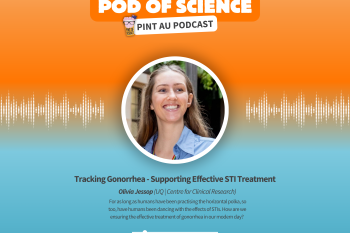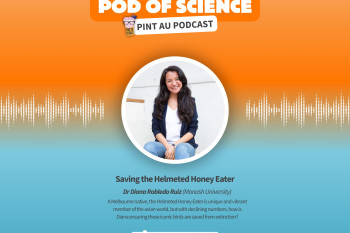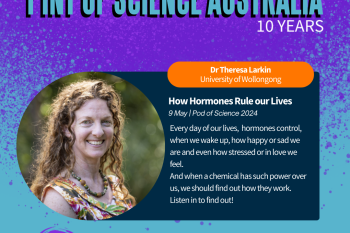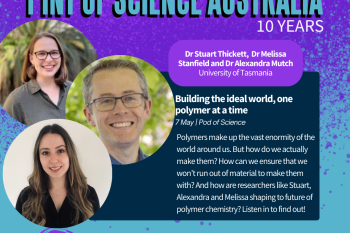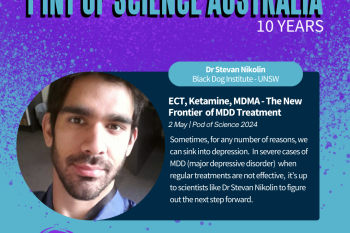© Pint of Science, 2026. All rights reserved.
Science is all about following the questions, but it can also be about getting better at something you enjoy. Listen in as we hear how Fonti Kar has gone from Lizard fight club to helping other scientists with their coding and programming.
~~
Transcript
Claryn: Welcome to another episode of Pod of Science, part of Pint of Science Australia. Today we have Fonti as our guest. Hello Fonti!
Fonti Kar: Hi Claryn, how's it going?
Claryn: I’m good thank you. Today we’re here to talk a bit about your journey to become a scientist.
That's not a linear one often it sounds really linear when you read about scientists careers but it's definitely not linear.
Claryn: So just what do you do now?
Fonti: I am currently working as a software developer at the University of New South Wales. I create software research tools for scientists in my field so I can make life easier for them and they can continue on doing science. And at the moment I’m living vicariously through them.
Claryn: That is very cool, so you create software that supports scientists?
Fonti: Yes, that's correct. Mostly it would be tools that we imagine would be readily used, makes it easier. Sometimes scientists develop their own tools but scientists already have a lot of stuff on their plate and so my role is to take some of those responsibilities and do it for them. So that they can just do the science.
Claryn: Okay okay yeah. So what led you to this area?
Fonti: It's a really good question so I’ve done a PhD and I’ve done a Masters, I’m sure we'll get to that later, but I did a lot of coding in in my Masters and my PhD and I find I’m, I don't know how i got into that, I really enjoy coding. There's something kind of like problem-solving Rubik’s cube, sudoku kind of style of coding. I just I find it very satisfying I really like solving problems and coming out with solutions and a coding context and I think I just followed that interest and chased those highs and that led me to become quite good at coding. And when this position came up I was like, oh yeah that sounds fun um it sounds flexible and so I applied and they thought I was okay and they thought I was suitable for the position and here I am.
Claryn: That's very cool you know chasing what you love. I’ve heard that your PhD is on behavioural ecology correct me if I’m wrong.
Fonti: Yeah that's right. Yeah I did my PhD on the behavioural ecology and evolutionary biology of lizards. Specifically I was interested in looking at how animals respond to environmental change. That's the very broad umbrella, one liner I often tell people, but specifically I look at the effects of temperature during the critical stages of development, so when lizards are an embryo. And then for my PhD, I focused on kind of the consequences once they've hatched from different environments and looked at their behaviour and physiology and cognition to understand these impacts of the environment.
Claryn: Oh, wow so you do actually like go out and like catch lizards and then see how they respond?
Fonti: Yeah there's a small component of fieldwork. So I would consider myself more an experimental biologist. So I went out and collect wild mama lizards and papa lizards and I brought them in the lab and made like a lizard hotel in our facilities here and allowed them, and they were comfortable that they bred. And I took their eggs, and the eggs of kind of what I worked with. I put them at different temperatures that mimicked um hot and cold temperature scenarios. And once the babies hatched there was at one point like 300 lizards in the lab, just so many babies running around.
Claryn: So you ran in like a baby nursery and see how do they grow up?
Fonti: Yeah exactly and it was a lot of work because I had to track every little baby lizard until they grew up.
Claryn: But wow that that is a big change from a lot of physical work to coding now.
That is true. I guess my PhD, you have to do everything you do the field work, to the experiments, to the data analysis and the writing up and the scientific presentation. So you kind of like you have to be good at everything. Whereas now for this job I feel like I’m mostly at my desk, I’m actually I am at my desk all the time there's no field work. So I try to try to do all the nature stuff in my free time on between the breaks.
Claryn: I see.
Fonti: But I think that's one of the biggest benefit of doing a PhD it does train you to do a lot of range of things. Some PhDs do go on to do different jobs or they stay in research. You know you get you get a lot of skills and people don't I don't think they give it enough credit that you do end up with lots of skills that are very transferable to different workplaces.
Claryn: Yeah that's something that it's not just you came up with a thesis that's it. So, what do you think you'll do next.
Fonti: That's a really good question Claryn. The next thing I wanted to want to do is maybe study carnivorous plants, which is a really big change actually. So carnivorous plants they lure insects or other small organisms to them and then they consume it as a nutrient source. I just find that really really cool and I just remember going to the botanic gardens they had a big exhibit on um kind of earth's plants. I was like “wow they are these are so weird these are plants that are like screw you nature I’m going to catch my own food!”
Claryn: Break the rules when it comes to being a plant. Interesting.
Fonti: Yeah, I and I’ve always considered myself a question biologist. So I’ve always been like “oh that's weird I wonder why” and that kind of just leads to my next research. So those are my plans.
Claryn: That is very nice. I like that its ambitious. So that would be your next big question, do you think there's like an obstacle to that?
Fonti: Yeah obstacles, absolutely. I think the biggest challenge… often researchers get really they get very specialized and very focused in a field. Whether that's like someone really loves dolphins and they want to learn everything about dolphins from top to end and so they get very specialized that way. Which is incredible because you've become a very big expert. Some scientists are very question driven so they'd like to ask the same questions in different systems. And I think I’m in between a bit of that as well as having very broad interests. So, I think one of the major challenges for any scientists that want to ask different questions or change different study organisms is to then have to re-establish that expertise, because it takes like a PhD or takes a significant amount of time to learn your way around. But working with the right people and just being very deeply involved and immersed in the knowledge is kind of the first place to start. It's scary but I think all it takes is time and connecting the dots. And often as a biologist that comes from a different field jumping into a new field you see the dots differently, so you connect them a different way and that's sometimes where really interesting science is born. So I’m excited for that but it does take a lot of work.
Claryn: Right, you can bring like pair of fresh eyes news perspective but also like getting to learn everything again is like time consuming.
Fonti: And I feel that with my current job at the moment. I kind of thought coming out of my PhD, I’m like oh I’m going to be an expert. I’m going to just jump in and just make these tools, and then I realize actually no I still need to learn quite a lot of like I’ve never software developed in my life. I still need to learn the rules that govern that job and still need to learn the skills. So I get to take a step back and change my mindset and be like, hey actually I get to you know, I got a cool degree I get paid to learn about how to do this that's really an exciting opportunity. And now I’m just embracing every new challenge as a learning experience, which it really makes it more enjoyable.
Claryn: Yeah that's great you know to have that continuous learning mindset. It's difficult I’m just going to go for it.
Yeah it's more expensive and I think it's more positive than like I don't know how to do anything. Which often scientists feel but you know somehow we're also really good at problem solving.
Claryn: I kind of want to know more about what you did in your Masters because you mentioned you also did a fair bit of coding. Well did that sort of help you like in your current job if you remember?
Fonti: Yeah no of course I remember my Masters. It does feel like a long time ago. I did my Masters looking at lizard fighting and lizard learning so it's very different. I mentioned I did a lot of coding, it's only in the analysis bit which I really enjoyed. But the core and you know the meat of the project is to understand you know why do male lizards fight? What makes a good fighter and what are the consequences of these contests on their learning?
Claryn: Okay that's really cool because I just have the idea like “yes go fight I’ll just observe”.
Fonti: Yeah that is exactly how you do it. I was running lizard fight club underground in a dark dungeon somewhere for a significant amount of time.
Claryn: What impact do you think like your lizard fight club and like lizard nursery … who else could it benefit?
Fonti: Yeah I think that's a very confronting question for a lot of biologists, especially behavioural, like biologists that kind of study really weird and wonderful things. That because it's very hard to make the connection of like lizard's fighting to you know human population health. There's just no direct link. Safe to say, I’m just I’m going to say a hundred percent certain there's no direct link. But as scientists it's really hard to know whether your research has an impact until it does. Science needs to progress slowly and bit by bit. I think scientists that work in animal behaviour or evolutionary biology have a tough time drawing direct links to say human population health or anything that can be beneficial for humans. I think that's not to say that there are no benefits for example, we are creating research methods that could be beneficial for a field. Like I’m using quite advanced statistical techniques that require you know decent coding, you know capabilities. So if you apply those same statistical models and a I don't know your modelling coronavirus for example I mean those may help identify patterns more precisely using these methods. But we're also as academics in these fields, we're also training the next generation of scientists. So we are adding to the army of scientists in the future. So whether and what those scientists in the future do is really completely up to them. The most liberating and exciting thing is that I won't know what my impact is until maybe 50 years later that someone digs through the archives and they find this paper about lizard fights. And they're like “oh my god I can do something with this.” So I think our legacy is something that is you know will be unknown until it is known.
Claryn: I find that a very interesting take on that because you know it's hard to deal with answers.
Claryn: And like how you just like just embrace what's coming next because ... I don't know like it's kind of inspiring.
Fonti: Yeah, I think someone once said to me you know life's too short to work on what everyone else is working on. And you should just, I’m really the type of person that really enjoy asking just funny questions and answering them.
Claryn: The question I do want to ask you is, What's the biggest challenge for science right now?
Fonti: I think one of the biggest challenge in science right now is to make it a space for everyone. So what by that i mean I think science is built on a system that favours unfortunately like white males. And I think we a lot of scientists are trying to make room for diversity. So you know over 50, at least 50 are females but there are also women but there are you know it's a spectrum of people. You know there are other less represented groups like from the LGBTQI+ community as well as you know other racial groups that are just a lot more underrepresented. So that's a challenge I don't have the answer for that. There are certainly lots of lots of groups and lots of grants, like funding for people in these in these groups. But um I think if people are in the position that is respected and are able a position of power I think they should use that platform to celebrate and to highlight diversity and the need for it, because we need all perspectives to solve a bigger problem in science. And there's heaps of studies that show you know more perspectives is good for problem solving. So we just need to make that slowly happen for science.
Claryn: Yeah it's a one big thing that you can't just do overnight, not even not even in a year or two. So it's just let's just put it out there.
Fonti: Absolutely it's yeah it won't be solved in my generation but it's already improved. Like there are there are a lot more female scientists now but still at the higher levels it's um it's a tricky career transition, like there's very few female senior academics. How can we fix that? Is it because you know people want to be mums as well as scientists, how can we create a space for that? Yeah how can we create the spaces for language barriers?
Claryn: How do we sort of allow people to be scientists and like also do what they want with their personal lives.
Fonti: Exactly yeah. Like those are important questions because you know we’re people first before we were scientists.
Claryn: Heavy.. but maybe finish with something light on like why you chose to be part of Pint?
Fonti: I was first exposed to Pint of Science events as an audience. I was just invited to go see a friend give their presentation in a pub and I thought it was a really fun format. You see the general public getting really excited about their research and you're having beer and you're having pub food it was so much fun. And then a couple of years later I had someone approach me just ask if I wanted to do it in a pub, and I was like that's really scary but okay. And so that was a really positive experience. And seeing again general public being very excited about your work and ask the right questions and questions that you don't often get in a scientific community, was really really exciting. And so this year now that so I just wanted to offer again my help and enthusiasm. I think science communication is just so important especially humanizing scientists that we're not boring people that sit in the lab with white coats. We’re again, humans before we were scientists.
Claryn: Yeah it's really important to highlight people solving problems that's the basic gist of it it's just how.
Fonti: Yeah absolutely, and I think Pint of Science is just a really great you know non-profit platform that really celebrates the science.
Claryn: Thank you for being our guest and having a chat with me.
Fonti: No that's okay thank you so much.
Claryn: You have been listening to a Pod of Science. You can find all our episodes on SoundCloud and Spotify. Don't forget to support your festival by visiting pintscience.com.au and following us on the socials.
